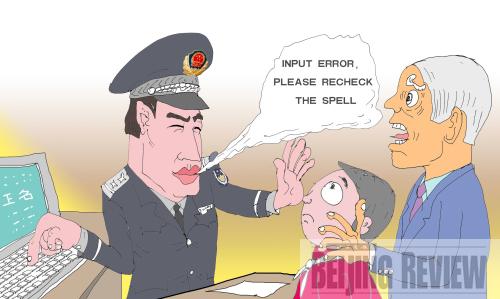|
 |
|
LI SHIGONG |
Simplified Chinese characters were introduced nearly 50 years ago as a way of increasing literacy. However, in response to a trend toward using unusual or ancient characters in baby names, the government is releasing a list of 8,000 characters that are selectable when naming newborns.
Wang Ning, a Chinese language expert and Deputy Director of the Institute of Linguistics at the Chinese Academy of Social Sciences, predicted that the list would help rein in a growing trend of unusual names, which she deemed essential to guarantee other personal rights related to names.
Statistics from police authorities, which take charge of residence and identity registrations, show that nearly 8,000 characters that are being used by Chinese citizens in their names cannot be found in the government's 76,000-character computer database. Most of the unknown characters are either wrongly written or self-made. Police officers have reiterated regulations that require citizens to use only standard Chinese characters in their names. Once the new table of characters is announced, parents will have to make up names for children within the scope of the list, bringing an end to the current trend of more inventive names.
The mandatory naming list, slated for release later this year, has sparked controversy around the country.
According to language experts such as Wang Ning, the new list will provide adequate Chinese characters for parents to name their children. In an effort to better implement the law on standard Chinese, the list, containing 8,000 simplified characters in combination, could convey almost any concept in the language, the experts said.
Those strongly opposed to the list argued that language experts never had the power to develop a compulsory list for naming. They also called on authorities to refrain from limiting free name choices of citizens simply in hopes of facilitating greater administrative expedience.
Keep it simple
Wang Ning (Beijing Morning Post): Everyone has the right to a name as part of personal rights, and a move to discipline the use of unusual characters in names is in the best interest of these personal rights. Names are a major tool often used for people to communicate or to maintain stable social relations. If a name is too difficult to be recognized or remembered because its characters are rarely seen or used in our daily lives, it will be ineffective in promoting an efficient, functioning society.
Bai Feng (www.cnhan.com): Names are a way for individuals to differentiate themselves from one another and serve as a marker for facilitating communication among strangers. An unusual name is very likely to add difficulties in communicating with new contacts, whereas a more common name is conducive to better expression.
Having an easily recognized name will make for a more resonant personal message while preserving parents' rights to freely name their children. As language experts have assured, the characters on the new list will be plentiful enough to give parents many choices in naming their children.
Song Qiang (www.ifeng.com): The Chinese language has many unusual ancient characters that are not frequently used today. Such characters present difficulties in a computerized era because they are not standard enough to be recognized by computer input systems.
Standardization is a trend of social development. Techniques involving production of automobiles, mobile phones and even medicines have been standardized to ensure more efficient production and use. The same must be applied to names through the introduction of a mandatory list of name characters.
| 